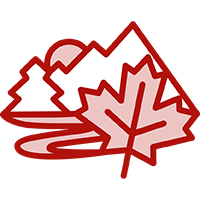 Alternatives to Burning
Alternatives to Burning
Reduce, Reuse, Recycle
The biggest source of smoke and smoke complaints for many communities on the Island is the burning of leaves, branches, twigs and other garden waste. Reducing this activity requires the development of good alternatives. Some communities have created a green tax that covers the cost of regular curb-side garden waste pick-up, seasonal pick-up, or a drop off location. Other communities simply encourage composting or creating garden spaces where this material will break down naturally while providing wildlife habitat. Victoria and Oak Bay manage their huge volumes of deciduous tree leaves with an annual leaf pickup. Tofino's new Outdoor Burning Bylaw begins with a commitment to introduce a chipping program for residential waste. Seeking out the best methods to reduce, reuse, and recycle garden and household waste and making them readily available to the public are critical tasks for effective air quality management. Cost effective alternatives to backyard burning are necessary for public buy-in and compliance with burning bylaws. These are best accomplished through cooperative governance and the integration of municipal and regional resources. One of the key building blocks for this kind of delivery is regional solid waste management planning.Solid Waste Management Planning
The Provincial Environmental Management Act directs Regional Districts to develop their own Solid Waste Management Plans (SWMP). Guiding principles for those plans incude: 1. The consumption of material and energy resources is set at a level that is ecologically sustainable.2. The regional solid waste stream is reduced to the greatest extent possible, in accordance with the hierarchy of reduce, reuse, and recycle, and consistent with local resources and the nature of the regional solid waste stream.
3. The goal of environmental policy is zero pollution and the strategies for achieving that goal are in accordance with the precautionary principle.
4. Individuals and firms are enabled to make environmentally sound choices about consumption of resources and generation of waste through provision of appropriate information, including user-pay and market-based incentives, wherever possible.
5. Reduction policies and strategies are developed through public consultation and are socially accep0table and cost-effective, based on full accounting of costs and benefits, both monetary and non-monetary. The Canadian and Provincial goal for recycling (waste diversion) is 50%. The average recycling rate for BC Regional Districts is 32%. In 2005, the ACRD disposed of 24,248 tonnes of garbage and recycled an estimated 4,321 tonnes of material, resulting in a recycling rate of only 15%. In 2015, the Alberni-Clayoquot Region District had a solid waste disposal rate of 758 kg/person making it the third highest in BC. In 2007, the ACRD 1996 SWMP was revised. The plan included programs policies, and infrastructure to reducing the amount of waste requiring disposal; increase the level of recycling activity; and ensure that any residual waste is disposed of in a manner that protects environmental and social well-being. Surprisingly, after extensive planning and consultation, the proposed recycling program, developed in accordance with the above principles and at minimal cost, was abandoned by all of the Alberni Valley electoral areas, except for Beaver Creek.